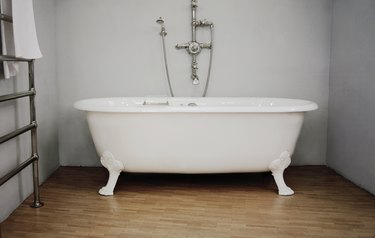
Manufacturers mold polyvinyl chloride, or PVC, into flooring, plumbing pipes and other construction items. PVC is ultimately just a complicated way to say "vinyl," a term many people are more familiar with. This synthetic compound is essentially a plastic made from a combination of carbon, hydrogen and chloride. Like wood planks and various kinds of tiles, PVC flooring has both pros and cons.
PVC Pros
Video of the Day
PVC is a 100 percent recyclable product that requires minimal energy and natural resources to produce. PVC begins as rock salt and crude oil, both of which are readily available. Its production does not involve plants of any kind, unlike bamboo, cork and hardwood floors. Flooring made of PVC is also flame-resistant, which adds a layer of fire protection to homes. In addition, PVC flooring is highly customizable, durable and water-resistant. Available in tiles and interlocking panels, PVC flooring is also much easier for do-it-yourself installers than many other types of flooring.
Video of the Day
PVC Cons
PVC creates a softer floor than hardwood or tile, making it more resistant to dents and scratches but more susceptible to gouges from sharp objects, like pet toenails. PVC can mimic the look of other types of flooring but not their feel. PVC is also the subject of much debate where toxicity is concerned. Many fear that this man-made material holds dangerous chemicals that could outgas and cause cancer. Others feel that this outgassing is a myth. One potentially harmful chemical in PVC, known as phthalate, can outgas, NBC News reports, but many manufacturers now make phthalate-free PVC. Some homeowners are still concerned, however, and avoid vinyl when they can.
- Armstrong: PVC Makes Good Sense
- Veekay Polycoats Limited: PVC Flooring
- FloorDepot2U.com: Pros & Cons of PVC flooring vs Solid Wooden Flooring
- Mother Earth News: Is PVC Safe? The Vinyl Debate
- Healthy Building Network: Phthalate-Free Plasticizers in PVC
- NBC News: Chemicals in Vinyl Flooring and Wallpaper Raise Worries